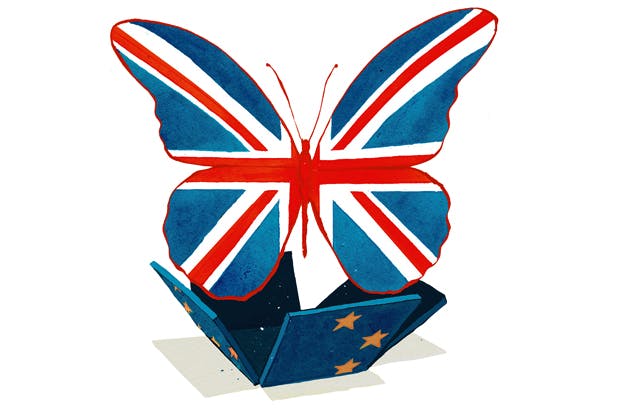Over the next few weeks, we can expect breathless reporting about the Brexit deal and its dynamics: the state of phytosanitary checks in the Irish Sea and the desirability of chlorinated chicken. But the real question about Brexit is about what type of country we become, once the process is complete and sovereignty has been retrieved from Brussels. And it’s a question to which the Conservative government is finally beginning to provide an answer.
Theresa May’s concluding speech to her conference was one of the best she has given as leader. She spoke about what Michael Howard called the British dream: that children and grandchildren of immigrants and refugees can, in this country, rise to the cabinet. She emphasised that Britain is ideally placed for a global trading future: we can talk to Shanghai in the morning and San Francisco in the evening. It was hard to believe that this was the same leader who was snarling about ‘citizens of nowhere’ two years ago.
May’s speech was one of the rare highlights. For the rest of conference week, the main hall was often half-empty. Fringe meetings, by contrast, were packed, with people often queuing an hour in advance.
Two other speakers stood out: Boris Johnson and Sajid Javid. The Home Secretary pointed out that the famous economic success of Singapore (where he used to work) is not down to trade deals; it has very few. Singapore thrives because it has a decent education system (which, like many of Britain’s former colonies, outperforms Britain’s) and it welcomes international investment. Its infrastructure is outstanding, as are its skills — which is why companies like to invest there. If the point of Brexit is to look outwards, towards the wider world, then trade deals will only be a small part of this. The crucial thing is to make Britain into a more open country, freed from the mindset of ‘Fortress Europe’ protectionism.
Javid also attacked the ludicrous ‘pub quiz’ which we set aspiring citizens, asking them to name the sixth wife of Henry VIII, and instead proposed a ‘values test’ to identify those who clearly have no truck with our liberal democracy. He spoke about the need to recruit more skilled workers, and more foreign investment. There was no reference to the Prime Minister’s dangerous idea of cracking down on foreign buyers of British properties. (An idea which seems at odds with her conference speech, and which is a dangerous note to sound at a time when the world is wondering if Brexit means Britain hoisting up the drawbridge.)
This is the paradox of Brexit. There are three ministers devoted to it: the Foreign Secretary, the International Trade Secretary and the Brexit Secretary. But the success of Brexit will come down to the Education Secretary, the Home Secretary, the Chancellor and others. If they can’t make Britain a better place in which to live, work, invest and bring up children, we might as well have stayed in the EU.
This is what made Boris Johnson’s speech so interesting. He chose to lead not with Chequers and Brexit but with the housing crisis. As he correctly identified, there is no issue which has driven young voters towards Jeremy Corbyn more than their inability to afford a home — a freedom which many of their own parents took for granted. There is something seriously wrong when people with good jobs cannot afford to buy a property. No one can expect capitalism to thrive when so few people can afford a stake in it.
Boris said Conservatives should be constantly aiming to cut taxes and stop treating business as if it were somehow morally dubious. He said that Brexit would bring the ability to get further ahead on bioscience, data, financial services and tech.
These are ideas that should be coming from the cabinet. That they are not, even at such a crucial time, raises questions as to whether the party deserves to remain in power after the next election.
Mrs May has a battle to fight over the next few months, as well as a deal with the EU to strike. At conference she spoke as if what happened after Brexit would be someone else’s responsibility. She acknowledged that there is talent in the Labour party, ‘but not on the front bench’. Many would say the same about her own party. And while her speech was one of her best, prime ministers are judged by what they do rather than what they say.
As we argued here last week, Theresa May’s premiership does not deserve to be prolonged beyond next March. It will then be for someone else to revive Conservatism. There is as yet no clear front-runner for the job, but the winner must be the candidate who can best answer the question: what can a Conservative government do to help people help themselves? That has always been the key to a successful Conservative government, and it will remain so.






Comments